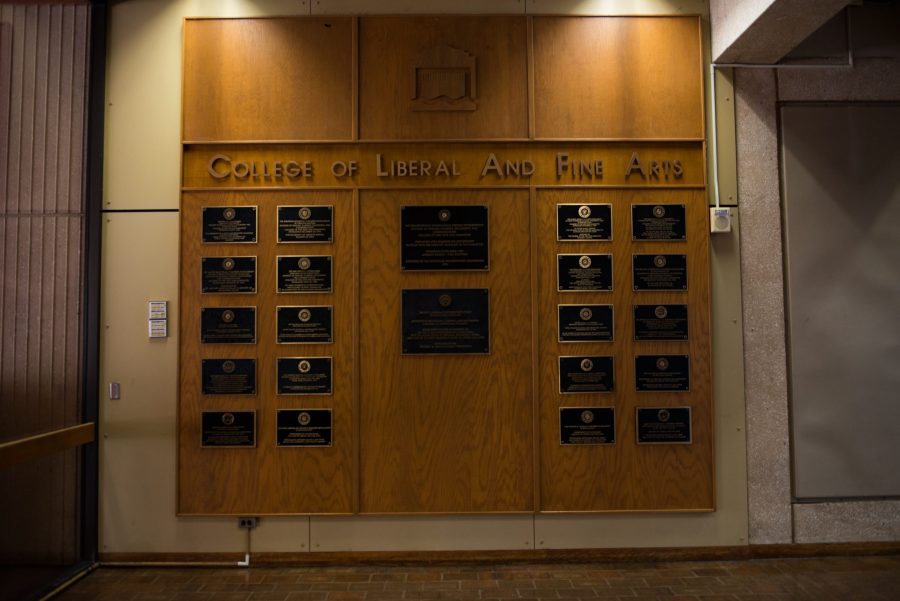This is the second installment of a series on COLFA’s budget situation.
“All the pain is being suffered by one group–i.e. NTT faculty without contracts–in the college,” Dr. Alistair Welchman, associate professor of philosophy and faculty senator at UTSA, said, in reference to a resolution sent out on Oct. 31 by the Faculty Senate Executive Committee (FSEC) and Faculty Senate, advising solutions to the College of Liberal and Fine Arts budget.
The resolution instructed faculty to electronically submit their votes by Nov. 2.
The resolution passed with 32 approvals, 2 rejections and 1 abstention, and was electronically submitted to Interim Provost Dr. C. Mauli Agrawal. It’s currently awaiting an official response.
Reflecting the concerns of UTSA’s faculty, the resolution mapped out suggestions on short and long term solutions for the issues surrounding COLFA’s budget constraints.
“I think everyone in the university feels that (faculty and students) are hurting here, and that there’s a general will to figure something out,” Welchman said.
Dr. Welchman and the rest of the Faculty Senate expedited the resolution in a short amount of time, attempting to meet COLFA administration halfway in an effort to alleviate the effects on COLFA’s non-tenure track (NTT) faculty.
He added that the cancellation of six out of nine tenure/tenure-track faculty searches has also affected the departments expecting those hires.
Joe Izbrand, chief communications officer of UTSA, said that on a few occasions COLFA has overspent, but there were previous budget reserves to cover those expenses. “We have a tight budget and all colleges are expected to live within their budget allocations,” he said.
Students are worried that fewer introductory courses will increase class sizes, negatively impacting the quality of their learning experience.
“The class sizes growth isn’t good,” Serge Pinal, sophomore global affairs & public administration major, said. “It puts more pressure on the professors because they have to accommodate to a larger audience.”
“One-on-one discussions with professors are extremely important,” Coco Olivares, freshman global affairs and modern languages major, said. “Students shouldn’t have to teach themselves, it’s not the point of a classroom setting.” Olivares also noted that interaction among classmates are diminished in large classrooms.
These student’s concerns about the upcoming spring 2017 semester may not be completely unfounded. A comparison between the introductory liberal arts classes offered in the fall 2016 and spring 2017 semesters shows a decrease in sections, an increased number of students in courses.
This semester, there were eight sections offered for Intro to Literature (800 slots), the upcoming spring semester will have three sections (585 slots).
U.S. History: Civil War to Present offered 13 sections in fall 2016 (2,047 slots) and will offer nine spring sections (1,596 slots).
The 16 sections offered for Intro to American Politics this semester (3,158 slots) will be reduced to eight sections (2,792 slots).
Intro to Psychology nine sections (1,716 slots) will be reduced to six (846 slots).
“If I didn’t have a minor, I wouldn’t even be able to be a full-time student in the spring semester because of how few classes are offered for my major now,” said Gabriella Rodriguez, junior cultural anthropology major.
“They should be letting students know what is going on and not leaving us in the dark.”
Despite this, Izbrand assured that students will be able to enlist in their required courses.
“Our focus remains on providing the courses that students need to complete their degree requirements and graduate on time,” he said.
Welchman urges students unable to register for required courses to speak to their academic advisers and department chairs immediately.
“We are all totally committed to finding some way for students to get through; we’ll do anything we can in terms of figuring out course substitutions and informing students about what other courses they could take.”
“I’m optimistic that we can work together to reinstate some of these courses, maybe all of them,” he said. “Students should definitely not give up.”
“Work with advisers, work with your chairs, and keep your fingers crossed that the whole university can come together and get us over this.”












